Pilates Reformer Glossary of Terms
The world of Pilates can have many terms that you have never come across before especially when you are a newcomer. Below we have collated a list of terms to help you familiarise yourself!
Pulley Rod/Pulley Upright:
The Pulley Rod or Pulley Upright is the upright part of the reformer, usually found at the opposite end to the springs, secured into the frame. These allow for the Pulley Ropes/Reformer Ropes to be fed through and allow for a smooth glide when using the ropes for a number of different exercises.
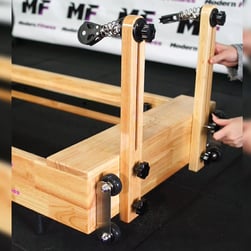
Pilates Footboard/Jumpboard:
The jumpboard on a Pilates reformer is a padded, flat platform that attaches to the footbar end of the reformer. It's used primarily to add plyometric (jumping) exercises to Pilates workouts, allowing practitioners to perform low-impact cardio while lying on their back.
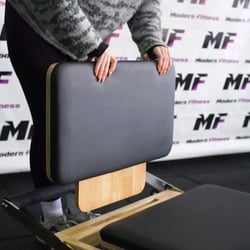
Foot Strap:
The footstrap on a Pilates reformer is typically found at the end of the reformer carriage, and it's used primarily during reformer exercises that involve lying prone (on your stomach) or seated. It provides anchoring and stability, allowing you to engage specific muscle groups more effectively.
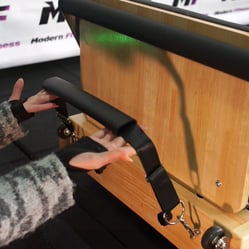
Carriage Board:
In Pilates, the carriage (sometimes referred to informally as the carriage board) is the moving platform on the reformer that you lie, sit, kneel, or stand on during exercises.
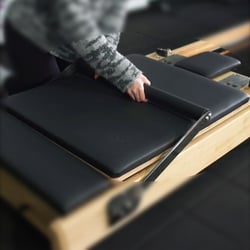
Foot Bar:
The footbar on a Pilates reformer is a horizontal, padded bar located at one end of the machine. It plays a central role in many exercises by serving as a platform for your feet or hands to push against, helping to generate movement of the carriage and engage specific muscle groups.
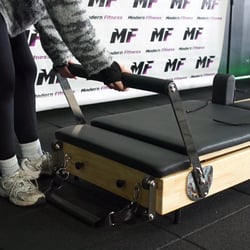
Trapeze:
The trapeze is a suspended horizontal bar, usually padded, that hangs from adjustable springs or straps. It's part of the overhead metal frame and is used for pulling, pushing, hanging, swinging, and stretching exercises.
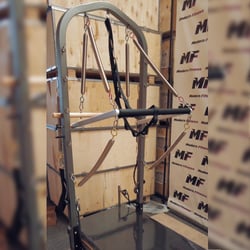
Pilates Box:
The Pilates box (also called the reformer box or long/short box) is a padded, rectangular block used with the Pilates reformer to expand the range of exercises you can perform. It allows for more variety, support, challenge, and comfort in different body positions.
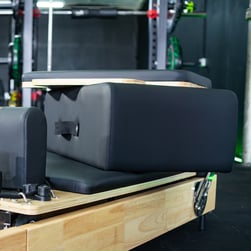
Shoulder Blocks:
The shoulder blocks (also called shoulder rests) on a Pilates reformer are two padded supports located on either side of the headrest on the carriage. They serve as stabilisers and alignment guides during exercises, especially when lying on your back.
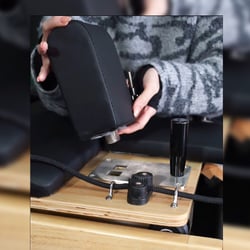
Pilates Pole/Gondola Pole:
The Pilates pole, also known as the gondola pole, is a long, lightweight wooden stick (usually around 4–5 feet long) used as a balance aid and alignment tool, primarily in reformer and mat Pilates.

Hand/Foot/Pulley/Double Loops
The hand or foot loops (also known as Pulley or Double Loops) on a Pilates reformer are padded straps attached to the ends of the reformer ropes, and they're used to perform a wide range of exercises that target the arms, legs, core, and back.
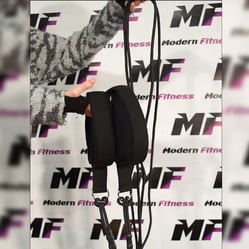
The Pulley Rod or Pulley Upright is the upright part of the reformer, usually found at the opposite end to the springs, secured into the frame. These allow for the Pulley Ropes/Reformer Ropes to be fed through and allow for a smooth glide when using the ropes for a number of different exercises.

Pilates Footboard/Jumpboard:
The jumpboard on a Pilates reformer is a padded, flat platform that attaches to the footbar end of the reformer. It's used primarily to add plyometric (jumping) exercises to Pilates workouts, allowing practitioners to perform low-impact cardio while lying on their back.

Foot Strap:
The footstrap on a Pilates reformer is typically found at the end of the reformer carriage, and it's used primarily during reformer exercises that involve lying prone (on your stomach) or seated. It provides anchoring and stability, allowing you to engage specific muscle groups more effectively.

Carriage Board:
In Pilates, the carriage (sometimes referred to informally as the carriage board) is the moving platform on the reformer that you lie, sit, kneel, or stand on during exercises.

Foot Bar:
The footbar on a Pilates reformer is a horizontal, padded bar located at one end of the machine. It plays a central role in many exercises by serving as a platform for your feet or hands to push against, helping to generate movement of the carriage and engage specific muscle groups.

Trapeze:
The trapeze is a suspended horizontal bar, usually padded, that hangs from adjustable springs or straps. It's part of the overhead metal frame and is used for pulling, pushing, hanging, swinging, and stretching exercises.

Pilates Box:
The Pilates box (also called the reformer box or long/short box) is a padded, rectangular block used with the Pilates reformer to expand the range of exercises you can perform. It allows for more variety, support, challenge, and comfort in different body positions.

Shoulder Blocks:
The shoulder blocks (also called shoulder rests) on a Pilates reformer are two padded supports located on either side of the headrest on the carriage. They serve as stabilisers and alignment guides during exercises, especially when lying on your back.

Pilates Pole/Gondola Pole:
The Pilates pole, also known as the gondola pole, is a long, lightweight wooden stick (usually around 4–5 feet long) used as a balance aid and alignment tool, primarily in reformer and mat Pilates.

Hand/Foot/Pulley/Double Loops
The hand or foot loops (also known as Pulley or Double Loops) on a Pilates reformer are padded straps attached to the ends of the reformer ropes, and they're used to perform a wide range of exercises that target the arms, legs, core, and back.

